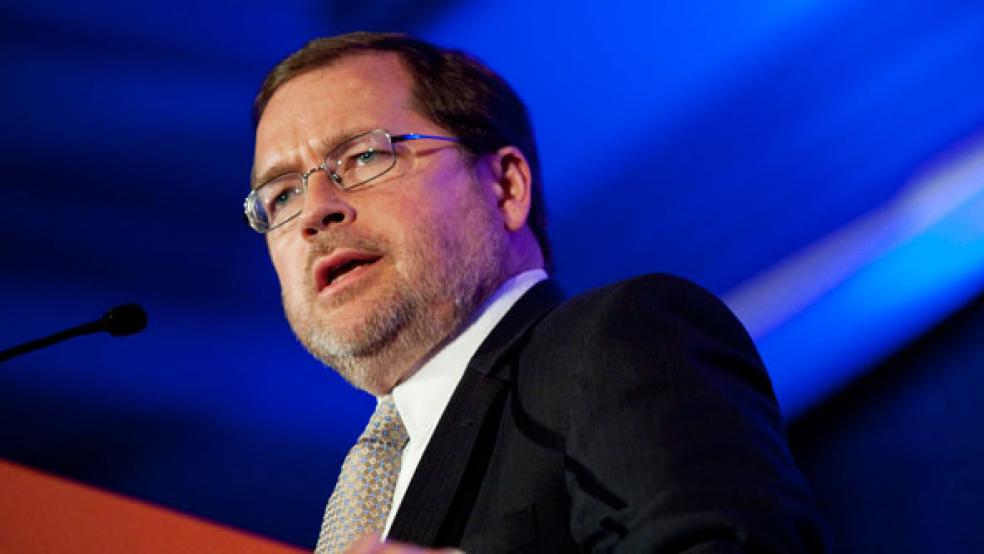At times, it has seemed that Republican lawmakers eyeing a fiscal compromise with President Obama were moving closer to a public split with Grover Norquist, author of the famous no-new-taxes pledge that has defined conservative politics for decades.

Yet Norquist, whose influence in the conservative movement spans well beyond his well-known fixation on taxes, remains an unwavering force in the GOP debate — and even some of the most prominent lawmakers publicly flirting with a break from Norquist have assured him in private that they remain loyal soldiers in the anti-tax cause.
Sen. Saxby Chambliss (R-Ga.), for example, might have seemed a perfect illustration of the trend away from Norquist’s hard-line views when he said recently that policies backed by Norquist would lead to more debt. “I care too much about my country — I care a lot more about it than I do Grover Norquist,” the senator told a Georgia TV station.
RELATED: Grover Norquist: 15 Things You Don't Know About Him
But five days later, on the phone with Norquist, Chambliss was sounding a conciliatory tone. As Norquist read aloud a transcript of Chambliss’s earlier remarks, item by item, Norquist recalled later, the senator repeatedly assured him on each one that he did not mean to imply they had major differences when it came to GOP principles on taxes. “He said he’d wished he hadn’t invoked my name and wished that he’d been clearer,” Norquist recalled from the Monday conversation.
Norquist said he came away from the conversation with this understanding of Chambliss’s position: “If he’d get a jillion dollars of spending cuts, he’d be willing to get rid of a deduction or two.”
Chambliss’s office said he was unavailable for an interview. A Chambliss aide later said that the purpose of the call was “most definitely not an apology.” In a written statement to The Washington Post, the senator said he and Norquist agree on “the vast majority of fiscal policy,” including that tax rates should not rise and spending should be reined in, though he added: “Grover disagrees with my longstanding position of using some revenue from closing special-interest loopholes to pay down our national debt, which is something I’ve never apologized for.”
For two decades, Norquist, 56, has been the most ardent enforcer of the Republican Party’s anti-tax theology. And Republicans have dutifully hewed close to that dogma. But humbled by last month’s election results, and facing a determined President Obama in deficit-reduction negotiations with tax rates set to rise Jan. 1 for all Americans as part of the “fiscal cliff,” several Republicans in recent days have expressed a willingness to compromise. Some have suggested striking a deal with Obama to raise tax rates on higher-earning Americans, as the president has pushed for, or rolling back tax credits and closing loopholes as a way to increase revenue — stances that could well violate the Norquist pledge.

The debate over the fiscal cliff presents a test for Norquist, whose influence is likely to rise or fall depending on how the fight plays out in the coming weeks — and what punishment, if any, Norquist can exact on GOP lawmakers he views as transgressors.
“There are going to be some people who took that pledge that vote for tax increases, and the way he handles that will either preserve his influence or diminish it,” said Charlie Black, a veteran Republican lobbyist and strategist. Still, for now, Black acknowledged, “he is as influential as ever.”
More evidence of Norquist’s enduring influence in the GOP came last week in the way conservatives closed ranks around him during an unusually packed session of the regular meeting of activists and GOP officials Norquist hosts every Wednesday at his Americans for Tax Reform offices near Metro Center.
One after the other, participants rose to congratulate Norquist for his multiple television and radio appearances defending the tax pledge, and to assure the crowd that Republican activists and lawmakers would stand firm against Obama’s call to raise taxes. Attendees included emissaries from House Speaker John A. Boehner (R-Ohio) and Senate Minority Leader Mitch McConnell (R-Ky.).
“The fact they’re attacking Grover really shows the impact of what he’s doing,” Rep. Steve Scalise (R-La.), incoming chairman of the conservative caucus in the House known as the Republican Study Committee, said as the room burst into applause and cheers. Scalise then declared himself “proud to be a pledge signer.”
Norquist says he will not hesitate to support 2014 primary challenges against Republicans who violate the pledge. His group spent $15.7 million in the 2012 election, mostly against Democrats, according to the Center for Responsive Politics. The threat of a primary fight is unnerving for many Republicans, and it helps explain why even some of Norquist’s apparent critics in the GOP — such as Chambliss, who is up for reelection in 2014 — want to smooth over any apparent tensions.
Sen. Lindsey O. Graham (R-S.C.) told ABC last week that Norquist was wrong to oppose finding new revenue by capping deductions and that “I will violate the pledge, long story short, for the good of the country, only if Democrats will do entitlement reform.” The remarks did not faze Norquist. In an earlier private telephone chat, Norquist said, Graham had assured him that he would compromise on taxes only if Democrats agreed to entitlement changes “on a massive scale” — prompting Norquist to tell Graham that he would “never be tempted” to raise taxes because the left would never make such a concession.
Rep. Tom Cole (R-Okla.), who caused a stir when he urged House Republicans to consider letting taxes rise on the highest-earning Americans to preserve lower rates for others, later told CNN that “I admire Grover Norquist, I think he’s doing a lot of good,” and that he was “honored” to have signed the tax pledge. Cole said he did not think his idea violated the pledge.
RELATED: Norquist: GOP Can't Have Fingerprints on Tax Hikes
Norquist said he also has had private conversations with Sen. Bob Corker (R-Tenn.), who said Sunday on “Meet the Press” that he was “not obligated to any pledge other than my oath.” Norquist, appearing on the same program, said Corker had been “seduced into thinking, well, maybe I’ll have a small, tiny tax increase and have real reform and we’ll move forward.”
Norquist’s influence extends beyond the famous anti-tax declaration. In addition to heading Americans for Tax Reform, which he launched at the behest of President Ronald Reagan to lobby for White House priorities during the 1986 tax debate, Norquist is closely aligned with some of the GOP’s most well-heeled and politically active groups. He sits on the board of the National Rifle Association, for instance.
Americans for Tax Reform does not disclose its donors, but The Post reported in April that Crossroads GPS, the political organization co-founded by Karl Rove, gave Norquist’s group $4 million in 2010. Norquist also has built clout among key activists and politicians in Washington and around the country through his regular Wednesday meetings. His focus on fiscal policy, a unifying issue across all facets of conservatism, has helped Norquist take on the additional role of a sort of orchestra conductor for the political right.
The meetings, begun in 1993 with a small group rallying opposition to President Bill Clinton’s health-care plan, now bring together fiscal hawks, social conservatives, tea party followers, home-schoolers, gun enthusiasts, opponents of same-sex marriage — even Republican gays and abortion rights backers — for invitation-only strategy sessions. Top GOP officials or their staff members attend each meeting, as do key conservative group leaders. During the George W. Bush presidency, the White House regularly dispatched senior aides to attend.
“I’ve never seen anyone who understands coalitions more fully,” said Marjorie Dannenfelser, president of the Susan B. Anthony List, which raises money to elect women who oppose abortion rights, and a regular Wednesday attendee. “I’m in there with pro-choice Republicans.”
The off-the-record meetings have been replicated in 48 states. Norquist and his staff help coordinate those gatherings, giving him frequent and direct access to governors, state legislators and key activists on the ground far outside the Beltway — and in the backyards of GOP lawmakers considering a break from the tax pledge.
In 2009, Americans for Tax Reform moved locations, and Norquist custom-designed a meeting space with stadium seating and a giant glass wall to allow for sidebar conversations among participants who come to network as much as to listen to presenters. At the 1 1/2-hour meeting, an intern counts participants every 15 minutes so Norquist can monitor the level of attendance throughout each session. Last week, with Norquist at the center of the fiscal-cliff debate, there were as many as 205 attendees.
Norquist used characteristically colorful language to warn Republicans that should they agree to raise taxes on wealthy people, pressure will mount for them to give even more ground. “The reason you don’t want your fingerprints on the murder weapon,” he said, “is that someone will ask you to use it again.”
Heads nodded in approval.
This article originally appeared in The Washington Post.




